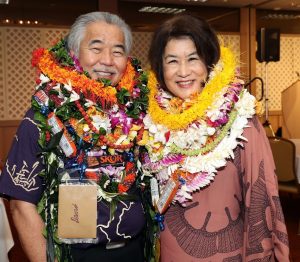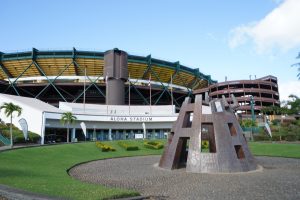From the governor: Mahalo to the people of Hawai‘i
Posted on Nov 8, 2022 in Capitol Connection, Featured, MainIt’s been an extraordinary time for Hawai‘i and the rest of the world as we emerge from the pandemic and take stock of how our lives have changed. Despite COVID-19 — and because of it — we’ve learned lessons that will carry us into the future. At the heart of it has been Governor Ige and his team, who have worked with the community to help keep us safe and make progress on some of the state’s most pressing needs. This last issue of Capitol Connection reflects on how far we’ve come in eight years and the foundation laid for the future.
Q. When you decided to run for governor, what did you feel needed changing and where have we made the most progress?
A. After being in the legislature for so long, I thought there were a lot of things we could do better — in housing, sustainability, education, renewable energy, and modernizing state government. We’ve made significant progress in all these areas. The pandemic also showed us where the gaps were — especially in health care. COVID-19 helped move us to a more sustainable model for tourism to balance community needs and resources with diversified economic growth.
Kaka‘ako is a prime example of how we had to change the way we build affordable housing. Kaka‘ako used to be 90% luxury housing, not built for local residents. We refocused the issue and improved the system to develop more affordable housing, such as Hale Kewalo, Keauhou Lane and Artspace Lofts, in that area. By the time I leave office, we’ll have finished 15,000 units statewide — 9,400 of them affordable — with more in the pipeline. Dur ing our administration, Hawai‘i became a world leader in clean energy transformation and sustainability. We actually doubled production of electricity from renewable sources, with nine more future projects that can start to reduce the cost of energy for the community.
Q. What would you say to young people about a future in public service?
A. I’m thankful for anyone who chooses government service. I understand businesses are having trouble finding enough staff, but what better mission could there be than to serve the public and improve the quality of life in Hawai‘i? I really believe that the thousands of government workers don’t get enough credit for the jobs they do. That’s why I wanted to use technology to modernize state systems and give departments the tools and resources they need to serve the public better.
Q. What do you want to say to the people of Hawai‘i as you leave office?
A. We’ve been through so much together: COVID-19, Red Hill, hurricanes, floods and more. What I value most are the people and the beauty of Hawai‘i. I still marvel at our aloha spirit during the height of the pandemic when virtually everyone understood the importance of putting the community first. I’m so grateful people realized we all had to make sacrifices, and that made a huge difference. It’s been an honor and a privilege to have served as governor during this critical time in our state’s history.
Q. What can you tell us about the rest of your time in office and future plans?
A. We’re racing to the end of our term, working every day until Dec. 5. We want to get the tax rebate out to residents and implement pay adjustments for teachers to reduce compression. The First Lady and I will be taking a vacation, then we will be looking at opportunities to continue our work in education, sustainability, climate change and technology.
Q. Why do we need a different approach in planning for a new Aloha Stadium?
A. Two actions by the 2022 state legislature have led us to take a simpler approach to the project. For the first time, funding of $350 million was appropriated by law to build the stadium without a public-private partnership. Second, the administrative responsibility for the project was shifted by the legislature to the Department of Business, Economic Development, and Tourism for better coordination with other related agencies. The straightforward design/build approach we’re pursuing will help us construct the stadium as quickly as possible without the financial uncertainties of a public-private partnership. I’ve never seen a financially viable P3 plan for the stadium district that didn’t involve long-term operating deficits of millions of dollars for the state. We’re not starting from scratch, and we want to build on the community input already received. DBEDT is looking at what can be used of the previous work and putting together the team we would need to execute the project successfully. I haven’t given up on the bigger vision of an entertainment district with housing and other commercial elements, but the housing should be something our residents can afford, not just market-rate, which is what would be needed to generate revenue.
Q. What concerns you most about the current divisive political climate nationally?
A. I’m definitely concerned about our system of checks and balances that was supposed to be the cornerstone of our democracy. Congress has become dysfunctional and even our court system has been politicized. I can’t believe there are so many people on ballots in other states who continue to believe — despite all evidence — that the last presidential election was “stolen.” And it doesn’t help that so many people are getting their news from sources that aren’t reliable so they don’t know what is true and what isn’t. These are all reasons for people who care about their communities and the rule of law to stay informed on the issues, exercise their right to vote and work toward more positive change.
Read more in the November/December Capitol Connection newsletter.

